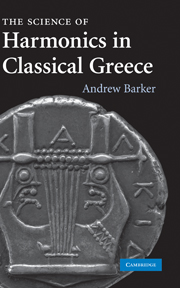Book contents
- Frontmatter
- Contents
- List of figures
- Preface
- Part I PRELIMINARIES
- Part II EMPIRICAL HARMONICS
- Part III MATHEMATICAL HARMONICS
- Chapter 10 Pythagorean harmonics in the fifth century: Philolaus
- Chapter 11 Developments in Pythagorean harmonics: Archytas
- Chapter 12 Plato
- Chapter 13 Aristotle on the harmonic sciences
- Chapter 14 Systematising mathematical harmonics: the Sectio canonis
- Chapter 15 Quantification under attack: Theophrastus' critique
- Postscript: the later centuries
- Bibliography
- Index of proper names
- General index
Chapter 12 - Plato
Published online by Cambridge University Press: 22 September 2009
- Frontmatter
- Contents
- List of figures
- Preface
- Part I PRELIMINARIES
- Part II EMPIRICAL HARMONICS
- Part III MATHEMATICAL HARMONICS
- Chapter 10 Pythagorean harmonics in the fifth century: Philolaus
- Chapter 11 Developments in Pythagorean harmonics: Archytas
- Chapter 12 Plato
- Chapter 13 Aristotle on the harmonic sciences
- Chapter 14 Systematising mathematical harmonics: the Sectio canonis
- Chapter 15 Quantification under attack: Theophrastus' critique
- Postscript: the later centuries
- Bibliography
- Index of proper names
- General index
Summary
We have already called on Plato's help from time to time, and that is as it should be, even if we set aside his gigantic stature in the Western philosophical tradition. Once due allowance has been made for the fact that the conversations in his dialogues are fictional (though most of the characters are not), and for his own attitudes, prejudices and philosophical aims, the dialogues are an unparalleled source of information about the cultural milieu inhabited by elite Athenians and intellectually eminent visitors to the city in the late fifth and early fourth centuries, about the beliefs they held and the issues they discussed, and about the ways in which their ideas were expressed and debated. It is only to be expected, too, that music should figure prominently as a topic in these conversations, in view of the central place it held in every Greek's cultural experience. In fact, however, Plato shows rather little interest in it in his earlier work. There are various passing allusions, and a small handful of passages which from other perspectives have real theoretical interest; but in the context of a study of harmonic science, none of them has much to offer.
MUSICAL ETHICS IN THE REPUBLIC AND THE LAWS
With the Republic the scene changes. Musical imagery becomes abundant, and sometimes does serious philosophical work; and there are two major set-pieces on musical topics.
- Type
- Chapter
- Information
- The Science of Harmonics in Classical Greece , pp. 308 - 327Publisher: Cambridge University PressPrint publication year: 2007



